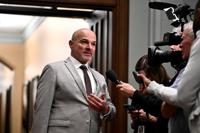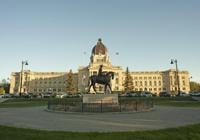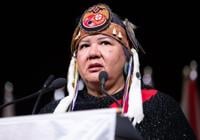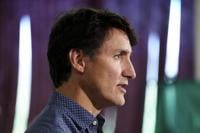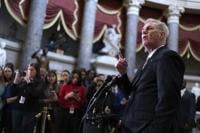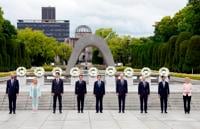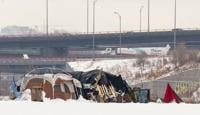OTTAWA - Afghanistan's pre-Taliban envoy has kept his country's Ottawa embassy running in the hopes that democracy will eventually return to his homeland, as he asks şĂÉ«tvs to fight "gender apartheid."
"There is a need for greater advocacy efforts in support of women and girls in Afghanistan," said Hassan Soroosh, the ambassador of the Islamic Republic of Afghanistan.
The Taliban has tried to rename the country, calling it the Islamic Emirate of Afghanistan since it seized Kabul in August 2021, but it remains a globally unrecognized government.
That leaves Soroosh providing consular services and advocating for Afghans everywhere. As of late, that's included pushing the Trudeau government to lift legal prohibitions on delivering şĂÉ«tv humanitarian aid in the country.
"In terms of number and gravity, we are still having the largest humanitarian crisis globally in Afghanistan; 28 million people are in need of humanitarian help," he said.
"Canada has always been one of the first countries to respond to humanitarian emergencies in Afghanistan."
Humanitarian groups say Global Affairs Canada has told them that purchasing goods or hiring locals in Afghanistan would involve paying taxes to the Taliban, which might be considered under the Criminal Code as contributing to a terror group.
That advice was given despite a cascade of humanitarian crises, from a collapsing health-care system to soaring rates of child malnutrition.
The government has said it plans to amend the Criminal Code as early as this spring.
Some aid groups consulted on the measure, who did not want to be named to avoid damaging their relationship with the government, said they're expecting the Liberals to table legislation as soon as this week, which might change multiple provisions regarding terrorism in the Criminal Code.
Soroosh said Canada's contributions to United Nations agencies working on the ground have helped, but şĂÉ«tv groups can play a role in helping people recover from a dire humanitarian situation and one of the coldest winters on record.
"I personally hope that there will be an effective solution for this very soon."
Soroosh stressed multiple times that humanitarian groups cannot let charity be diverted to the Taliban, but he had confidence şĂÉ«tv groups know how to navigate this issue.
"It's very important to make sure that aid will be directly and effectively delivered to vulnerable people, and that the Taliban will not be able to benefit from aid, or use aid delivery as a tool for legitimization or consolidating power."
Media have reported on allegations that the Taliban has used international aid to line its pockets, and the lack of formal paper trails makes those claims hard to disprove. International banking sanctions mean aid generally moves through informal networks known as hawala, which have no central reporting.
"There have been a lot of cases of this nature and the past few months," Soroosh said. "For international NGOs that continue to work in Afghanistan, it has been a dilemma."
The Taliban has barred women from working with humanitarian groups, a devastating blow to a sector where women make up at least one-third of the workforce and can access spaces that men generally cannot.
Soroosh said the Taliban is dismantling two decades of gains for women in Afghanistan and bringing back some of the most repressive measures from the 1990s.
"While the situation has been basically disastrous and painful for all people in Afghanistan, it has been more painful for women and girls because they're being pushed out of public life in a systematic manner. "
Women are barred from going to gyms and parks and the Taliban has done public floggings of those who left home without a male guardian.
"According to many international experts, these repressive measures against women and girls in Afghanistan amount to a gender apartheid," Soroosh said.
On Sunday, Amnesty International urged the UN Human Rights Council to stop Taliban impunity, citing "the suffocating crackdown on the rights of women and girls, and targeted executions of ethnic Hazara people."
The group said the world needs a multi-year fact-finding mission to keep track of human rights abuses in the hopes of one day prosecuting Taliban leaders.
In Ottawa, Soroosh said countries should do more to isolate the regime, such as engaging more with civil society groups.
He said countries like Canada could make ongoing talks in Qatar with Taliban officials conditional on the regime ending certain practices, or even sanction elites so they can't take vacations abroad.
"It requires collective international efforts in terms of putting greater pressure on the Taliban. Because it seems that the Taliban so far have not felt the real pressure to change their policies and approach," he said.
"Politically speaking, as experience shows in the case of Afghanistan, no regime and no system can survive without embracing the will of the people."
That is why the embassy and consulates Soroosh oversees in Toronto and Burnaby, B.C., have defied attempts by the Taliban to take control of diplomatic missions.
Instead, all three offices have cut their expenses and staff. The Ottawa embassy went from a cadre of 19 staff to just two diplomats, three assistants and one part-time employee.
Yet Soroosh said the embassy's communication with Global Affairs Canada hasn't changed, with the same frequency of calls and meetings about everything from consular cases to advocacy for Afghans.
That's unlike in Washington, where the State Department took over Afghanistan’s embassy and consulates a year ago when they ran out of money, in part due to U.S. sanctions.
Now the Ottawa embassy provides consular services for Afghans in both countries, using fees as the only source of funding for the bare-bones operation in Canada.
The fees largely stem from certifying paperwork, such as updating Afghan driver's licences that people can then use to seek a provincial licence.
The embassy works with others around the world who have kept the flag flying to share resources and co-ordinate advocacy for Afghans, and to help with resettlement programs for refugees.
He said closing the embassy would mean abandoning Afghans in North America who need services and advocacy, and it would dishonour the sacrifice şĂÉ«tv soldiers made in Afghanistan.
"The majority of countries recognize states, not governments," Soroosh said.
"We want to be the voice of all people."
This report by şĂÉ«tvwas first published March 7, 2023.




